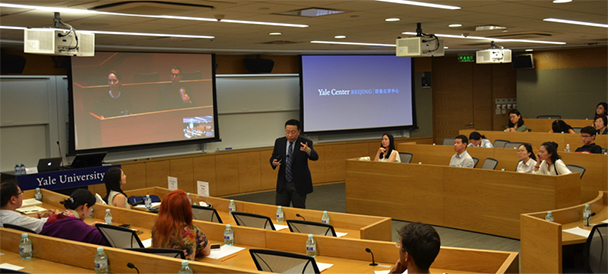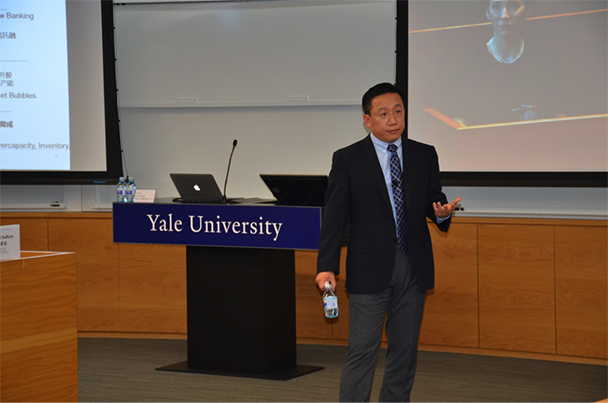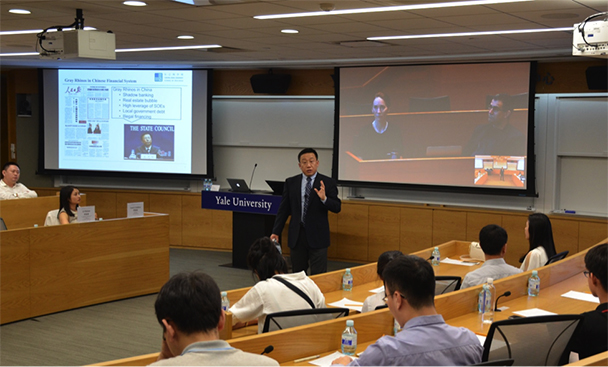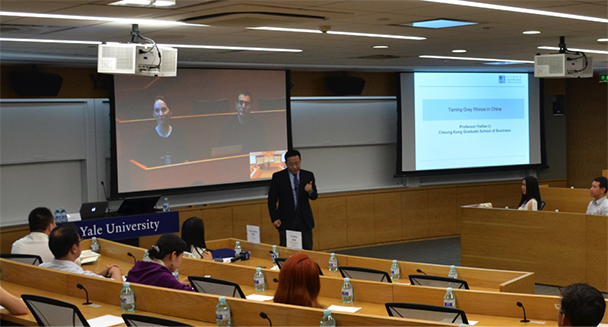China is not facing a financial crisis on the scale of 2008 and can best deal with its current predicament through growth, but faces significant threats in the form of five “gray rhinos”.
That’s according to Dean’s Distinguished Chair Professor of Finance at CKGSB, Li Haitao, who was delivering keynote remarks on financial systemic risk at a Yale Center event in Beijing this week.

After some introductory remarks by Yale School of Management Professor Andrew Metrick and Assistant Dean Melissa Fogerty, Prof Li – who earned his PhD in Finance from Yale – discussed the issue of “taming gray rhinos” in China.
In contrast to black swans, which are unseen threats that take us by surprise, gray rhinos are visible threats, but ignored until it’s too late. Prof Li laid out China’s five gray rhinos – shadow banking, the real estate bubble, high leverage of SOEs, local government debt and illegal financing (such as P2P platforms etc) – before asking what can be done to prevent those rhinos triggering a crisis.
“There is a bit of a paradox,” Prof Li said. “The Chinese government plays too big a role in the economy and that has led to the creation of these five rhinos, but, conversely, the government is now the one best placed to rectify this issue.”

“I believe all the risk in China can be managed, mostly because China still has huge room for growth. We will have problems, there will be losses and some defaults, but we can grow our way out of it and I believe the next 10-20 years will still be exciting.”
Prof Li Haitao explained that in China today, many people believe that they cannot lose money because, ultimately, they think that the government will bail them out by guaranteeing the financial products they buy, given them an incentive to leverage and to take risk. But he added that when the day of reckoning comes and these assets eventually stop making money, what follows can quickly become a crisis, because no one is able to pay off their debts.

“Unlike in the 2008 financial crisis in the US, Chinese households won’t default on their mortgages,” said Prof Li. “That’s not a problem. In China, the biggest problem comes from the misallocation of resources. People believe the Chinese government will never default, so they buy the riskiest debt and lever up to get the highest yields, with no thought of risk.”
The government, Prof Li continued, has reacted to slowing growth by tightening monetary policy, but he said that the Chinese financial system is not very efficient, with the result that there are lots of loopholes that can be exploited. He said that supply-side reform had been brought in to deal with these inefficiencies in the economy and that the second stage of this reform is deleveraging, but added that capital controls were an increasing point of focus for the government.
“If the RMB depreciates, there will be huge pressure on people to take money out of the banking system. The government has effectively closed down the borders to prevent a rush of money going out of China, and that has created time for the banking system to sort itself out, so in terms of fighting a crisis, this is a good move.”
